News & Events in Belarus
Lukashenko meets with government to address key social, economic issues
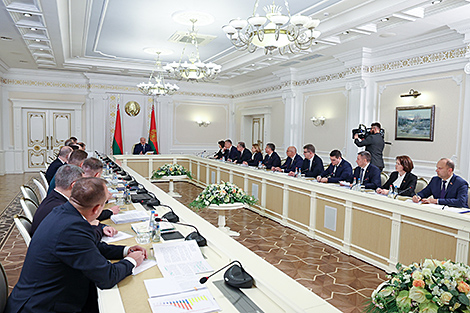
MINSK, 23 October (BelTA) – Belarusian President Aleksandr Lukashenko held a meeting with the leadership of the Council of Ministers in Minsk on 23 October, BelTA has learned.
The format of the event is traditional, as the head of state regularly holds such meetings with the government.
“Before making the most significant decisions, or those that strongly resonate in our society, we meet with you to consult. While making decisions, it is important for me to receive additional information from the initiators of particular issues,” the president noted.
This time, four pressing issues were on the agenda. They included the further development of the Belarusian Railways, the master’s degree system at Belarusian universities, the organization of the school meal system, and youth support.
The government requested support for Belarusian Railways. Aleksandr Lukashenko wondered whether spending has been sufficiently reduced.
Aleksandr Lukashenko said: “There is no doubt that the railway is the most important enterprise not only of the transport industry but of our entire country. Tens of millions of tonnes of freight are transported by rail every year. Those are raw materials, imports, and exports. It is the cheapest and safest mode of transportation for people. And although passenger transportation is more of a social aspect rather than a commercial aspect of the work, it is necessary to develop both.”
He stated that due to sanctions as well as the situation in Ukraine where several Belarusian freight trains have been literally seized as if by pirates and are being held, it was necessary to radically transform the traffic flow, come up with new logistics solutions, and get mobilized as a whole. Although revenues have decreased, Belarusian Railways’ shipping business remains profitable.
“According to the reports I am getting, the financial state of the enterprise is now exacerbated by the high cost of servicing the loans taken out for the sake of infrastructure projects and for buying new rolling stock,” the head of state noted.
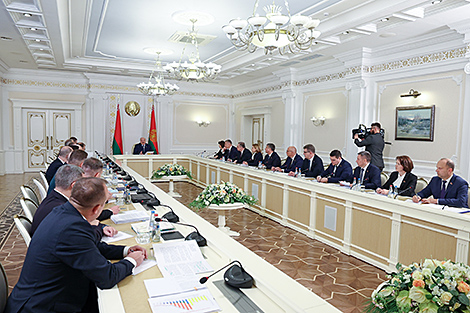
In order to stabilize the situation, an executive order on state support for Belarusian Railways has been drafted.
Lukashenko calls for review of master's degree system in Belarus
The president inquired about the current state of the master's degree system given the previously adopted decisions. “Several years ago we had a serious discussion on this topic and agreed: no Bologna Process. Our own education system is good,” the Belarusian leader said.
The head of state recalled that at one time, the Bologna Process was popular, promoted by certain figures. The idea was to train “jack-of-all-trades specialists” who would be in demand abroad. “I remember that conversation. Are you going to train people at Belarusian universities to work abroad?” he asked.
Aleksandr Lukashenko drew attention to the fact that many foreign students study in Belarus and would like to pursue a master’s degree program. “Fine, let’s do it this way. They pay for all types of programs, including the master’s. You can study in the program for as long as you want. It's your money, so we will teach you. After that, you can work wherever you like,” the president said.
Lukashenko reviews school meals system
The head of state reiterated his close personal oversight of the matter: “I have repeatedly warned you: robbing children and poisoning them with poor-quality food is criminal. And I then instructed you to develop a proper system.”
He went on saying: “I would like to hear what has been done in this regard.”
Despite official assurances that everything is okay, Aleksandr Lukashenko remarked that it remains difficult to know what is being cooked in schools, how it is made, and by whom. “It’s impossible to control this,” the president remarked, explaining why a clear system needed to be established.
The head of state also highlighted the problem of waste, stating that half the food is thrown away. He challenged officials with a series of questions: “Is this okay? What have we done to prevent this? How will we feed children so that the food is tasty, healthy, and stays warm?”
Measures to support youth on agenda at meeting with Lukashenko
The government presented a draft decree “On measures to support young people” for discussion at a meeting of Belarusian President Aleksandr Lukashenko with the leadership of the Council of Ministers in Minsk on 23 October.
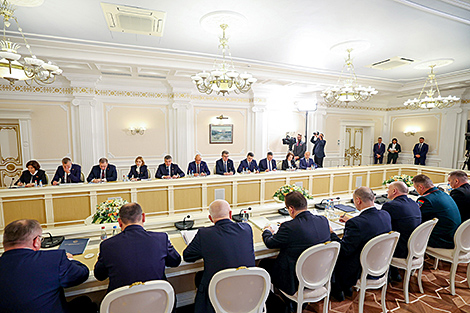
The document is designed to create conditions for attracting and retaining young professionals at enterprises.
Aleksandr Lukashenko called for a balanced approach to this matter. He noted that assistance to young people should not turn into overprotection, as the state also needs to allocate funds to other areas, including the development of the manufacturing sector and the economy. Furthermore, at a young age, people are perfectly capable of working and earning a living on their own. This stands in contrast, for example, to elderly people, who for objective reasons may find it more difficult.
Lukashenko wants housing for large families built evenly across country
The president noted that the construction of housing for military personnel and large families is among the state's priorities and will continue to be the number one issue. Furthermore, a great deal is already being done to support large families, including the assistance with housing construction and the Family Capital program.
However, regarding housing construction, the head of state was critical of the locations chosen for houses for large families. “We started building housing in Minsk, in convenient locations, drawing the workforce to the cities. What are we doing?” he said. “Why are we pulling large families towards Minsk? They should, like everyone else, live across the entire country. There should be an even distribution of labor, of workforce, like it was in Soviet times.”
Furthermore, outside of major cities, there is an opportunity to build not just apartments, but houses with garden plots where people can grow something. “People need to have an opportunity to garden or do something with their own hands. We've forgotten about this; we started building housing for large families in Minsk and regional centers,” Aleksandr Lukashenko remarked.
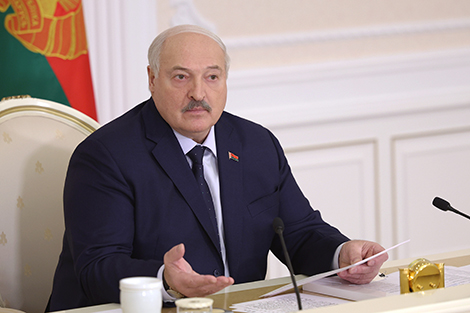
Aleksandr Lukashenko called for a balanced approach to this matter. He noted that assistance to young people should not turn into overprotection, as the state also needs to allocate funds to other areas, including the development of the manufacturing sector and the economy. Furthermore, at a young age, people are perfectly capable of working and earning a living on their own. This stands in contrast, for example, to elderly people, who for objective reasons may find it more difficult.
“I am not saying that we should not help young people. The youth are our future, and we must help them. Let us be specific about what we must help young people with, and leave it at that,” the head of state said. “We must create the conditions for young people to work.”
The president stressed that any promises made by the state regarding support or any benefits must be calculated and justified in advance, with the assurance that the state has the necessary funds to meet these future commitments. “We must be guided by reality, not just by constant demands for more benefits,” Aleksandr Lukashenko said.
The head of state has repeatedly pointed out that the country has no “extra” money. “And if we provide assistance and support to one part of our society, we must understand that this comes at the expense of those who work,” Aleksandr Lukashenko emphasized. “I want you to understand this logic when submitting proposals to me. I am frank with you. And let people judge my words for themselves.”
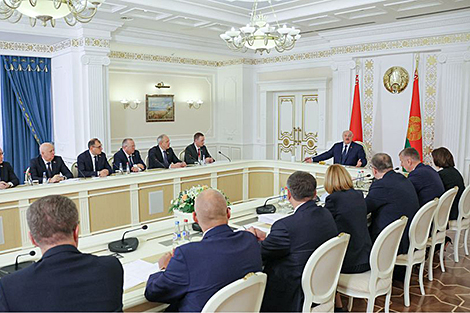
Consequently, the specific proposals suggested by the bill were reviewed but ultimately not endorsed. “Incentives for young professionals and relevant proposals are not limited to this bill,” stated Natalia Pavlyuchenko. “We will develop and propose new ideas. For now, we are postponing the measures discussed today to avoid excessive regulation.”
She explained that Belarus already has a robust system of support for young professionals at their first jobs, which includes a one-time payment and monthly bonuses. She noted that certain incentives are also stipulated in collective agreements between employees and employers.
As a recent example, she cited a decree signed by Aleksandr Lukashenko introducing additional payments for certain agricultural industry workers. The support system also includes fiscal measures, as young professionals are entitled to a standard tax deduction. Additionally, an employer-sponsored training agreement may include clauses on additional stipend payments from sponsor organizations.
“All these measures are systemic,” Natalia Pavlyuchenko emphasized.
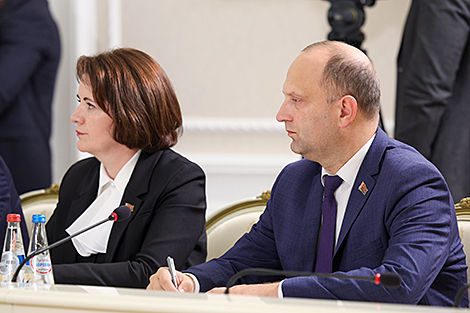







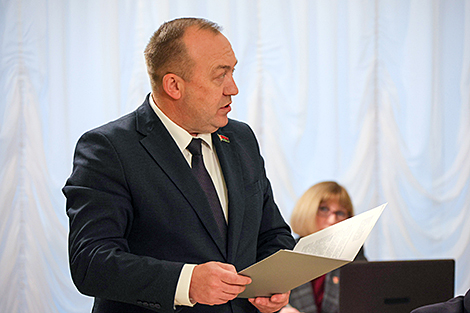
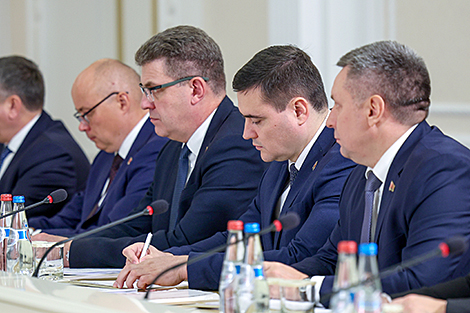
 print version
print version make home page
make home page add to bookmarks
add to bookmarks

